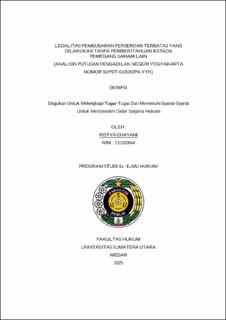| dc.contributor.advisor | Sunarmi | |
| dc.contributor.advisor | Arifiyanto, Joiverdia | |
| dc.contributor.author | Chayani, Ristya | |
| dc.date.accessioned | 2025-07-31T08:53:04Z | |
| dc.date.available | 2025-07-31T08:53:04Z | |
| dc.date.issued | 2025 | |
| dc.identifier.uri | https://repositori.usu.ac.id/handle/123456789/107949 | |
| dc.description.abstract | In the Indonesian corporate legal system, the dissolution of a Limited Liability
Company (PT) is a process governed by strict procedural rules outlined in Law Number
40 of 2007 concerning Limited Liability Companies. One of the fundamental principles in
this process is the involvement of all shareholders through the General Meeting of
Shareholders (GMS), which serves as the company’s highest decision-making body.
However, instances still occur where a PT is dissolved unilaterally without notifying or
involving all shareholders, particularly minority shareholders. Such actions raise
significant legal concerns regarding the legitimacy of the dissolution and the extent of
legal protection afforded to disadvantaged parties.
This study focuses on the Yogyakarta District Court Decision Number
92/Pdt.G/2020/PN.Yyk, which deals with the unilateral dissolution of a PT without prior
notification to other shareholders. The case underscores the importance of transparency,
accountability, and the protection of shareholder rights in corporate governance,
particularly in decisions involving the termination of a company’s legal existence. Using
a normative juridical method and qualitative descriptive analysis, this study explores the
statutory regulations governing PT dissolution, the legal implications of non-compliance
with these procedures, and the judicial reasoning behind the court’s decision.
Findings reveal that dissolving a PT without due notification violates existing
legal provisions and undermines the shareholder’s right to information and participation
in crucial decisions. The court rejected the defendant’s preliminary objections and
concluded that the unilateral dissolution without a legitimate GMS was unlawful. The
ruling emphasizes the necessity of legal safeguards for minority shareholders, including
the use of derivative lawsuits to assert their rights. Thus, a PT dissolution conducted
without proper notice is not only procedurally flawed but also threatens legal certainty
and can result in material losses for shareholders. | en_US |
| dc.language.iso | id | en_US |
| dc.publisher | Universitas Sumatera Utara | en_US |
| dc.subject | legality | en_US |
| dc.subject | dissolution | en_US |
| dc.subject | Limited Liability Company | en_US |
| dc.title | Legalitas Pembubaran Perseroan Terbatas yang Dilakukan Tanpa Pemberitahuan Kepada Pemegang Saham Lain (Analisis Putusan Pengadilan Negeri Yogyakarta Nomor 92/PDT.G/2020/PN.Yyk) | en_US |
| dc.title.alternative | Legality of Dissolution of Limited Liability Company Carried Out Without Notification to Other Shareholders (Analysis of Yogyakarta District Court Decision Number 92/PDT.G/2020/PN.Yyk) | en_US |
| dc.type | Thesis | en_US |
| dc.identifier.nim | NIM210200644 | |
| dc.identifier.nidn | NIDN0015026304 | |
| dc.identifier.nidn | NIDN0006118007 | |
| dc.identifier.kodeprodi | KODEPRODI74201#Ilmu Hukum | |
| dc.description.pages | 121 Pages | en_US |
| dc.description.type | Skripsi Sarjana | en_US |
| dc.subject.sdgs | SDGs 16. Peace, Justice And Strong Institutions | en_US |


